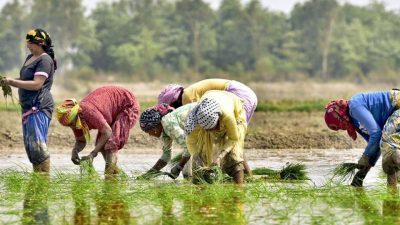Basmati Rice 01/05/2019 – Posted in: Daily News
Basmati production not restricted to limited states
For: Preliminary and Mains
Topics Covered: Rice Production, GI tags, Seeds Act 1966, Basmati Rice in India
News Flash
The Delhi High Court has struck down the decision of the Central government restricting basmati rice production to only seven States in the Indo-Gangetic plains.
Background
Madhya Pradesh government filed a plea seeking to make 13 districts in the State to be included in the Geographical Indications (GI) for basmati rice.
The Ministry of Agriculture had through two Office Memorandums (OM) — on May 2008 and February 2014 — confined the description of basmati rice grown in the Indo-Gangetic plains in the States of Punjab, Haryana, Delhi, Himachal Pradesh, Uttarakhand and parts of Uttar Pradesh and Jammu and Kashmir.
What were MP government’s claims
- Office Memorandums (OMs) were outside the scope of the Seeds Act, 1966.
- OMs encroach upon its power to pass laws in relation to agriculture, which is a State subject.
Though a 2014 OM, the Ministry banned registration of basmati variety for certification and foundation seed production outside the area earmarked under the GI for the same.
The Seeds Act, 1966
The parliament had passed to Seeds Act 1966 to provide legal framework around seed certification and make good quality seeds available to the cultivators.
- Under this act Seed rules were framed and notified in 1968 and systematic Seed Certification started in India in 1969.
- This act provided for establishment of a Central Seed Committee to advise the states in seed related matters. It also provided for establishment of Seed Certification Agencies in the states; Seed certification Boards and State Seed Testing Laboratories.
- This act applies to whole of India including Jammu & Kashmir.
- It covers seeds of food crops, oil crops, cotton seeds, seeds of cattle fodder and all types of vegetative propagating material.
- The Seeds Act is not concerned with where and how the seeds are used.
Basmati Rice in India
- Basmati 370 & Taraori Basmati are the two mainly cultivated Basmati varieties in India.
- Other improved varities are Pusa-1121, CSR-30, Pusa Basmati-1.
- Out of all these improved varities, Pusa Basmati-1 yields more and HBC-19 yield less (Traditional variety). Pusa-1121 has better aroma and yields almost same as Pusa basmati-1.
- Basmati rice crop requires evenly distributed rainfall throughout its growth and ideal temperature for its cultivation in 20 to 38. It also requires clear sky during day and low night temperature.
- Basmati rice can be grown in all of soils. However, heavy neutral soils like clay loam, clay and loamy are excellent for its cultivation. These soils have the property of holding water for longer period. The ideal pH range of soil for its better yield is 5.0 to 8.5. Alkaline or Saline soils are not suitable for its cultivation.
Geographical Indication (GI)
A GI is a sign used on products that have a specific geographical origin and possess qualities or a reputation that are due to that origin. In order to function as a GI, a sign must identify a product as originating in a given place.
Source: Livemint
You can follow us on LinkedIn and for more updates related to UPSC IAS Preparation, Like our Facebook Page and subscribe our Diligent IAS Youtube Channel
Also Read Related Daily News
- Asia-Pacific Broadcasting Union
- Malaria Elimination Research Alliance (MERA) India
- Polavaram National Irrigation Project

